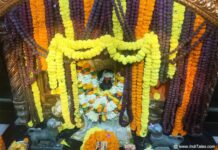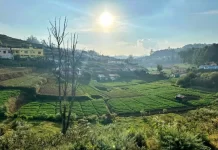Vaikuntha Perumal Temple is the most prominent Vishnu Temple located in Shiva Kanchi. Like Kailasanathar temple this is also a temple extremely popular with the students and scholars of history, art history, and temple architecture. So, I also ended up reading a full book on this temple before my Kanchipuram trip.

The long descriptions of the temple gave me the impression that this is a huge temple. Walls carrying so many stories must be long and wide. However, the temple is rather small. The complex is not really small, but the temple itself is quite compact and stunning, to say the least. It enthralls you with its rows of lion-shaped pillars in front of the profusely sculpted walls. They almost give the impression that they are guarding these stories of Gods and Kings.

I walked to the temple in the morning, passing by a dried temple tank with grass growing in its pit. Then came the small Gopuram with no tall Shikhara like the rest of the temples in Kanchipuram. A series of blue-colored metallic gates showed up at the entrance. Walking past the mandapam, I reached the temple. I literally had to hold my breath when I first saw it despite having seen enough images before. It is Beautiful!
Unique Architecture of Vaikuntha Perumal Temple, Kanchipuram
There are a few architectural and design elements that make this temple very different and special. Let me share some of them with you:
3 Tier Sanctum
This temple has 3 sanctums on three floors. Yes, you heard it right. Unlike a single sanctum in most temples, this one has three one on top of the other. 3 sanctums have 3 Vishnu images in 3 different poses.

The sanctum on the ground floor has Vishnu in a sitting position. There is a small mandapam in front of the Murti supported by the lion face pillars. The Vishnu Murti is large and almost overwhelms you with its size. It is believed that Vishnu advises the king in this sitting posture as Acharya.

The Murti on the first floor has the Vishnu in a lying pose known as Sheshashayee Vishnu, as he sleeps in the Kshirsagar. This murti rests in a rather smaller room with plain walls. In this pose, King serves Vishnu as a disciple would serve his Guru.
You can approach this middle floor through the staircase that goes around the temple. The catch is this floor is opened only on Ekadashi or the 11th of every fortnight of the lunar calendar followed in India. I was there the next day and had to really request the priest to open it for me. He made me wait for 3 hours before opening it for less than a minute and after taking a promise that no photographs would be clicked.

Second Floor
Second floor used to have a Vishnu Murti (some say Krishna) in a standing pose. The image has been stolen and no one knows where it is at the moment. So, this floor is closed and inaccessible. In this standing posture, it is believed Vishnu taught the king as many as 18 different art forms.

The architecture of the three floors is such that you can do circumambulation at each level & the staircase is not visible from anywhere in the temple complex.

3 floors, 3 Vishnu Murtis in 3 different poses – sitting, sleeping, and standing. I am not sure if the order has any significance, but I found this architecture quite unique.
The staircase from behind the ground floor sanctum opens up a huge sculpture of Vishnu in a sitting posture. It is probably the best-maintained sculpture in the temple complex.
Moat Around the Temple
The plinth of the main temple or sanctum sits below the level where you enter the temple. Or you can think of a moat separating the pillared corridor that runs around the temple and the platform on which the temple stands.

You naturally wonder how would the temple look when rains would fill up this area. I remember visiting Airateshwara Temple in Darasuram when it was full of water. The temple reflecting in the waters was a stunning scene. Though, here, space is limited to see the full reflection of the temple.
I found this feature quite unique in this temple. I am yet to understand if there is a practical reason to build the moat around the temple.
Walls with Stories

The walls of corridors surrounding the sanctum are full of stories. Now, most Hindu Temples have sculptures carved all around them. What makes this temple special is the fact that panels on the left walls depict the stories of Vishnu, whose home this temple is. On the other hand, the stories on the right wall depict parallel stories from the life of King Nandivarman who is credited with building this temple.

This juxtaposition of parallels between the stories of Vishnu and the King makes these sculptures interesting.

24 sculpted panels tell the Krishna Katha. There are Ganga & Yamuna on walls. Some interesting stories include the inclusion of temple architecture on the walls, of traders from far and wide indicating the trade connections of Kanchipuram in the good old days.

Sculptures are not in great shape. It does not look like they faced any vandalism, but the stone has started eroding with time. I hope some kind of conservation can be taken up to preserve these stories.
Lion Pillars of Pallavas
Tapering pillars with their base carved in the shape of a sitting lion are the hallmark of Pallava architecture in Tamil Nadu. You see them almost everywhere in Kanchipuram too, for it was the capital of Pallavas for a long time.

At this temple, these pillars in a neat clean row, stand out. Like I said before, standing in front of the sculpted walls, they look like guarding the stories. The visual they present is stunning. As this temple is not really crowded, you do get to see them without anyone blocking the view.

You would notice different colors of different pillars from pale sandstone to dark granite color. Even the stylistic details are different in pillars of different colors. This is because the pillars were restored during the Vijayanagara empire that much later ruled Kanchipuram. So, in a way, this tells you the history of temple restoration and gives you the imprint of each dynasty that contributed.
108 Divya Desam Temple
This temple is one of the 108 Vishnu temples that collectively make 108 Divya Desams. The followers of Vishnu make it a point to visit all of them in their lifetime. Kanchipuram alone has 14 of these 108 temples.
History of Vaikuntha Perumal Temple

This temple is the second oldest temple in Kanchipuram after Kailasanathar Temple. It was built by Pallava King Nandivarman II in the late 7th CE or early 8th CE and later maintained by the ruling Cholas and Vijayanagara kings. This makes it one of the earliest stone temples with Dravidian architecture. It would inspire the later temples in the region.
During Nandivarman II’s time, the temple was called Parmeshwara Vishnugriham, after the original name of the king Parmeshwara. It later came to be known as Vaikuntha Perumal Temple. Perumal is the name used for Vishnu in Tamil country.
Vishnu here is known as Vaikunthnathan. He lives here with his consort Vaikunthavalli.
The temple tank is called Airammadha Teertham.
Temple Legend
After I had admired the temple enough, I had this question – why was this beautiful Vishnu temple built in Shiva Kanchi when there is a whole Vishnu Kanchi in Kanchipuram? Out, comes the story that explains it all.
The story says that King Viroacha who ruled from here was childless. He prayed to Shiva seeking the blessing of progeny. Shiva blessed him that Dwarpalas of Vishnu will be born to him as sons. In time he was blessed with two sons. They grew up as great Vishnu devotees and Vishnu lives here as Vaikunthnathan. Vaikuntha, as you know, is Vishnu’s Dham or heaven or home, as you like to perceive it.
To me, this legend brings the two main sects of Hinduism – Shaivas, and Vaishnavas together as followers of deities who respect each other and co-exist peacefully.
Vaikuntha Perumal Temple Festivals
Every Ekadashi, i.e. the 11th of every lunar month, a day associated with Vishnu is celebrated in the temple. Vaikuntha Ekadashi is a big festival apart from Ram Navmi and Krishna Janamasthmi.
As per D Dennis Hudson in his book on Vaikuntha Perumal Temple, the Murti on the middle floor is worshipped in 12 different forms of Vishnu –
- Keshava
- Narayana
- Madhava
- Govinda
- Vishnu
- Madhusudan
- Trivikram
- Vamana
- Sridhara
- Hrishikesh
- Padmanabha
- Damodara
Each form is worshipped for a lunar month beginning with the 10th of each month.
Unlike Varadaraja Perumal Temple in Vishnu Kanchi, this temple is visited by very few people. That lets you appreciate the nuances of the temple architecture. However, you find that buzz and energy missing that comes from the prayers of the devotees.
Travel Tips
- It is located very close to the famous Kanchi Kamakshi Temple in Kanchipuram.
- Temple is open from 7:30 AM–12 PM and 4:30 PM–7:30 PM.
- Daily 6 Poojas take place in the temple.
- This temple is owned by ASI. There is an ASI guard there, who can help you guide around on request.
- Photography is allowed in the temple except inside the sanctum.
Do check out the famous Kanchipuram Saree Shops all over the city.















Beautifully elaborated.
Great architecture.
Thank you Abhishek.
VAIKUNTHA PERUMAL TEMPLE KANCHIPURAM is a really amazing place to visit. your article makes me feel like I am in the temple.
Sahil, do visit the temple as and when you can.
hello,
I have visited vaikuntha perumal temple . It contains amazing art and culture.
as you mentioned it is really a masterpiece.
thanks for sharing .
keep posting.
very good article and I like this your post
thanks
Good article with great art
Thank you for sharing this information..
The Vaikunta Perumal Temple in Uthiramerur, a village in the South Indian state of Tamil Nadu, is dedicated to the Hindu god Vishnu. The temple is constructed in the Dravidian style of architecture. Vishnu is worshipped as Vaikunta Perumal and his consort Lakshmi as Anandavalli. The temple was originally built by Pallavan, with later additions from the Chola.
This would be a great addition to the list – thanks for sharing!